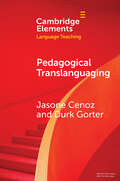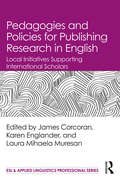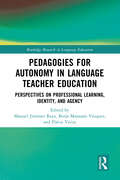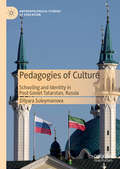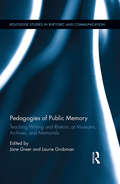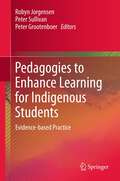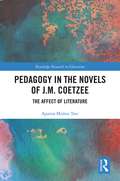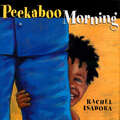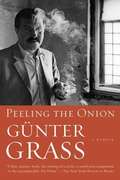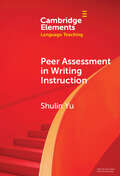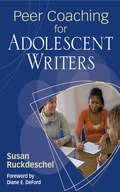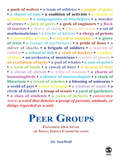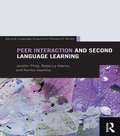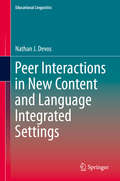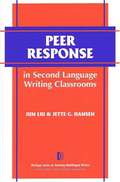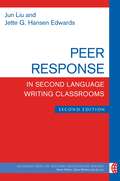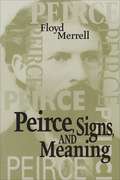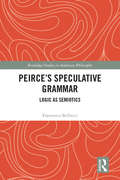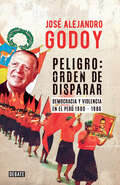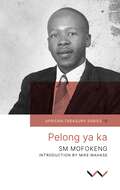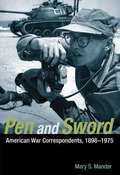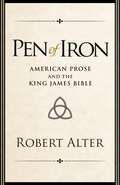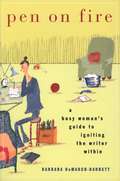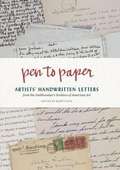- Table View
- List View
Pedagogical Translanguaging (Elements in Language Teaching)
by Durk Gorter Jasone CenozLearning through the medium of a second or additional language is becoming very common in different parts of the world because of the increasing use of English as the language of instruction and the mobility of populations. This situation demands a specific approach that considers multilingualism as its core. Pedagogical translanguaging is a theoretical and instructional approach that aims at improving language and content competences in school contexts by using resources from the learner's whole linguistic repertoire. Pedagogical translanguaging is learner-centred and endorses the support and development of all the languages used by learners. It fosters the development of metalinguistic awareness by softening of boundaries between languages when learning languages and content. This Element looks at the way pedagogical translanguaging can be applied in language and content classes and how it can be valuable for the protection and promotion of minority languages. This title is also available as Open Access on Cambridge Core.
Pedagogies and Policies for Publishing Research in English: Local Initiatives Supporting International Scholars (ESL & Applied Linguistics Professional Series)
by Karen Englander James N. Corcoran Laura-Mihaela MuresanOffering a nuanced examination of the complex landscape that international scholars who publish their research in English must navigate, this edited volume details 17 perspectives on scholarly writing for publication across seven geolinguistic regions. This innovative volume includes first-hand accounts and analyses written by local scholars and pedagogues living and working outside Anglophone centres of global knowledge production. The book provides an in-depth look into the deeply contextualized pedagogical activities that support English-language publishing. It also brings much-needed insight to discussions of policies and practices of global scholarly research writing. Bookended by the editors’ introductory overview of this burgeoning field and an envoi by the eminent applied linguist John M. Swales, the diverse contributions in this volume will appeal to scholars who use English as an additional language, as well as to researchers, instructors, and policymakers involved in the production, support, and adjudication of global scholars’ research writing.
Pedagogies for Autonomy in Language Teacher Education: Perspectives on Professional Learning, Identity, and Agency (Routledge Research in Language Education)
by Flávia Vieira Manuel Jiménez Raya Borja Manzano VázquezThis book aims to challenge established teaching cultures to promote teacher autonomy and autonomy-oriented pedagogies in language teacher education.Offering a set of inspiring case studies that illustrate language teacher education for autonomy as a space of multiple possibilities, the book fuses theory and practice and gives a holistic view of the changing landscape of language teacher education, accounting for the transformative power of educational practices that help teachers think and act in informed, context-specific, and learner-centred ways. It also demonstrates the importance of autonomy in language teacher education contexts, specifically to foster teachers’ professional learning, identity, and agency, as well as in assessing and reshaping teacher education programmes.This book will be particularly useful to researchers, scholars, and postgraduate students in the fields of teaching and teacher education, modern foreign languages, and teaching and learning language research more broadly. Curriculum designers and language teacher education programme directors may also find the volume of use.
Pedagogies of Culture: Schooling and Identity in Post-Soviet Tatarstan, Russia (Anthropological Studies of Education)
by Dilyara SuleymanovaThrough an ethnographic study of schooling in the Republic of Tatarstan, this book explores how competing notions of nationhood and belonging are constructed, articulated and negotiated within educational spaces. Amidst major political and ideological moves toward centralization in Russia under the Putin presidency, this small provincial town in Tatarstan provides a unique case of local attempts to promote and preserve minority languages and cultures through education and schooling. Ultimately, the study reveals that while schooling can be an effective instrument of the state to transform individuals as well as society as a whole, school also encompasses various spaces where the agency of local actors unfolds and official messages are contested. Looking at what happens inside schools and beyond—in classrooms, hallways and playgrounds to private households or local Islamic schools—Dilyara Suleymanova here offers a detailed ethnographic account of the way centrally devised educational policies are being received, negotiated and contested on the ground.
Pedagogies of Public Memory: Teaching Writing and Rhetoric at Museums, Memorials, and Archives (Routledge Studies in Rhetoric and Communication)
by Jane Greer Laurie GrobmanPedagogies of Public Memory explores opportunities for writing and rhetorical education at museums, archives, and memorials. Readers will follow students working and writing at well-known sites of international interest (e.g., the Flight 93 National Memorial in Shanksville, Pennsylvania, and the U.S. Holocaust Memorial Museum), at local sites (e.g., vernacular memorials in and around Muncie, Indiana and the Central Pennsylvania African American Museum in Reading, Pennsylvania), and in digital spaces (e.g., Florida State University’s Postcard Archive and The Women’s Archive Project at the University of Nebraska Omaha). From composing and delivering museum tours, to designing online memorials that challenge traditional practices of public grief, to producing and publishing a magazine containing the photographs and stories of individuals who lived through historic moments in the Freedom Struggle, to expanding and creating new public archives – the pedagogical projects described in this volume create richly textured learning opportunities for students at all levels – from first-year writers to graduate students. The students and faculty whose work is represented in this volume undertake to reposition the past in the present and to imagine possible new futures for themselves and their communities. By exploring the production of public memory, this volume raises important new questions about the intersection of rhetoric and remembrance.
Pedagogies to Enhance Learning for Indigenous Students
by Peter Sullivan Peter Grootenboer Robyn JorgensenThis book describes research undertaken by leading Australian researcher in Indigenous communities. While the chapters are Australian in their focus, the issues that are discussed are similar to those in other countries where there are indigenous people. In most cases, in Australia and internationally, Indigenous learners are not succeeding in school, thus making the transition into work and adulthood quite tenuous in terms of mainstream measures. The importance of being literate and numerate are critical in success in school and life in general, thus making this collection an important contribution to the international literature. The collection of works describes a wide range of projects where the focus has been on improving the literacy and numeracy outcomes for Indigenous students. The chapters take various approaches to improving these outcomes, and have very different foci. These foci include aspects of literacy, numeracy, curriculum leadership, ICTs, whole school planning, policy, linguistics and Indigenous perspectives. Most of the chapters report on large scale projects that have used some innovation in their focus. The book draws together these projects so that a more connected sense of the complexities and diversity of approaches can be gleaned.
Pedagogy in the Novels of J.M. Coetzee: The Affect of Literature (Routledge Research in Education)
by Aparna Mishra TarcCritically analyzing the representation of pedagogy in the novels of J.M. Coetzee, this insightful text illustrates the author’s profound conception of learning and personal development as something which takes place well beyond formal education. Bringing together critical and educational theory, Pedagogy in the Novels of J.M. Coetzee examines depictions of pedagogy in novels including Age of Iron, Elizabeth Costello, Disgrace, and Childhood of Jesus. Engaging with Coetzee’s varied literary use of pedagogical themes such as motherhood, maternal love, and the importance of childhood interactions, reading, and experiences, chapters demonstrate how Coetzee foregrounds pedagogy as intrinsic to the formation of human actors, society, and civilization. The text thereby aptly explores and broadens our understanding of education - what it is, what it achieves, and how it can affect and shape human existence. This text will be of great interest to graduate and postgraduate students, academics, researchers and professionals in the fields of pedagogy, postcolonial studies, educational theory and philosophy, and English literature.
Peekaboo Morning
by Rachel IsadoraA toddler plays a game of peekaboo, and you're invited to play too. First there's Mommy to find, with Daddy not far behind. Then Puppy comes peeking around the corner, and a favorite toy train brings the toddler to Grandma and Grandpa. Isadora's brilliant, joyful pastel illustrations capture the familiar and cozy people, toys and animals that will delight babies.Join this sweet toddler in the morning fun, sharing words your baby can repeat and pictures your baby will recognize. Then find out what this toddler sees next. It could be you!
Peeling the Onion
by Günter Grass Michael Henry HeimIn this extraordinary memoir, Nobel Prize-winning author Günter Grass remembers his early life, from his boyhood in a cramped two-room apartment in Danzig through the late 1950s, when "The Tin Drum "was published.
Peer Assessment in Writing Instruction (Elements in Language Teaching)
by Shulin YuThis Element traces the evolution of peer assessment in writing instruction and illustrates how peer assessment can be used to promote the teaching and learning of writing in various sociocultural and educational contexts. Specifically, this Element aims to present a critical discussion of the major themes and research findings in the existing studies on peer assessment regarding the three assessment paradigms (assessment of, for, and as learning), and to identify whether and how peer assessment has served the purposes of assessment of, for, and as learning, respectively in writing instruction. This Element highlights the contextual factors that shape the effect of peer assessment in writing instruction and concludes with directions for future research and implications regarding how peer assessment can be successfully used to improve students' writing development.
Peer Coaching for Adolescent Writers
by Susan RuckdeschelAligned with state and IRA/NCTE standards, this book offers clear steps and reproducible forms for using student-to-student interactions to help adolescents become more proficient writers.
Peer Groups: Expanding Our Study of Small Group Communication
by SunWolfClans, cliques, clubs, or classmates: Students of group communication should be encouraged to think critically about concepts to the groups that matter to them most—peers. Peer Groups is the first textbook to explore group communication dynamics with this vital group. Drawing on a combination of traditional and new theories, Dr. SunWolf uses an inviting writing style, shares the words and provocative thinking of real world group members, and draws on research from social psychology, communication, and group dynamics. This innovative book offers suggestions for critical thinking and new behaviors in students' own peer groups and will inspire further exploration of small group dynamics.
Peer Interaction and Second Language Learning (Second Language Acquisition Research Series)
by Rebecca Adams Jenefer Philp Noriko IwashitaPeer Interaction and Second Language Learning synthesizes the existing body of research on the role of peer interaction in second language learning in one comprehensive volume. In spite of the many hours that language learners spend interacting with peers in the classroom, there is a tendency to evaluate the usefulness of this time by comparison to whole class interaction with the teacher. Yet teachers are teachers and peers are peers – as partners in interaction, they are likely to offer very different kinds of learning opportunities. This book encourages researchers and instructors alike to take a new look at the potential of peer interaction to foster second language development. Acknowledging the context of peer interaction as highly dynamic and complex, the book considers the strengths and limitations of peer work from a range of theoretical perspectives. In doing so, Peer Interaction and Second Language Learning clarifies features of effective peer interaction for second language learning across a range of educational contexts, age spans, proficiency levels, and classroom tasks and settings.
Peer Interactions in New Content and Language Integrated Settings
by Nathan J. DevosTrade schools, universities, and programs for international students have begun to experiment with Content and Language Integrated Learning (CLIL) as a viable pedagogy for instruction, as the pedagogy of CLIL increasingly gains recognition as a practical form of language and content education in Europe and beyond, and its application in instructional settings becomes more diverse. Corresponding with CLIL's growth, this book focuses on foreign language use during peer interactions in a new CLIL setting. It particularly concentrates on how to conduct research when the focus is on learner interactions. The theoretical background, research methods, and research instruments are explained in a brief and understandable manner. This book is intended for those interested in CLIL and peer interactions and includes a framework and ideas for investigating new CLIL contexts in a practical manner allowing undergraduate and graduate students to conduct their own research in these settings.
Peer Response in Second Language Writing Classrooms
by Liu Hansen Jun Jette G.Peer response in which students work together to provide feedback on one another's writing in both written and oral formats through active engagement with each other's progress over multiple drafts, has been discussed in L2 writing literature since the early 1980s. While peer response activities have now become a common feature of L2 writing instruction, much of the research in peer response studies presents conflicting data. There is a need for a comprehensive survey of it in an effort to help teachers sort out what may or may not be useful to them in the classroom. Peer Response in Second Language Writing Classrooms was written to fill that void. Peer Response in Second Language Writing Classrooms will provide teachers with practical guidelines for making peer response effective in the classroom and will offer a theoretical grounding on the purposes and importance of peer review, or feedback, as it relates to current writing instruction pedagogy.
Peer Response in Second Language Writing Classrooms, Second Edition (The Michigan Series on Teaching Multilingual Writers)
by Jun Liu Jette Hansen Edwards<P>There have been a number of major developments in second language (L2) writing and peer response teaching and research since the publication of the first volume of this book in 2002. Two of these, in particular, are worth mentioning as they have motivated the substantive revisions we have made to the Second Edition of Peer Response in Second Language Writing Classrooms. <P>The first of these is the increased interest in the use of computer-assisted language learning (CALL) and, specifically, computer-mediated communication (CMC) for L2 pedagogy, particularly after the emergence of Web 2.0 technologies in the mid-2000s. These technologies have had a significant impact on how L2 writing and peer response are being researched and taught. In the Second Edition of Peer Response in Second Language Writing Classrooms we examine the use of both asynchronous and synchronous CMC for L2 peer response, including a detailed look at the benefits and drawbacks of a range of CMC technologies, including wikis, blogs, Facebook, and email. <P>The second major development—influenced no doubt by the unparalleled access today’s teachers and researchers have to information through the internet—is the accessibility and visibility of research on L2 peer response from a wide range of regions and countries across the globe. In making revisions to the content of the Second Edition of Peer Response in Second Language Writing Classrooms, we draw on research findings from a range of countries and cultures including China, Korea, Hong Kong, Taiwan, Japan, Vietnam, Thailand, Saudi Arabia, Iran, Lebanon, Turkey, and Egypt, among others. Incorporating voices and research from across the globe greatly enriches and expands the body of research on peer response, and offers some evidence that peer response is becoming a norm in L2 writing classrooms around the world. <P>The Second Edition of this book offers insights from a careful synthesis of the research, and draws on real life experiences of both authors in teaching peer response at different proficiency, age, and experience levels, and with a range of modes. By incorporating research on CMC for peer response, and particularly the use of Web 2.0 technologies, the Second Edition has been revised for the next generation of L2 writing classrooms.
Peirce, Signs, and Meaning (Toronto Studies in Semiotics and Communication)
by Floyd MerrellC.S. Peirce was the founder of pragmatism and a pioneer in the field of semiotics. His work investigated the problem of meaning, which is the core aspect of semiosis as well as a significant issue in many academic fields. Floyd Merrell demonstrates throughout Peirce, Signs, and Meaning that Peirce's views remain dynamically relevant to the analysis of subsequent work in the philosophy of language. Merrell discusses Peirce's thought in relation to that of early twentieth-century philosophers such as Frege, Russell, and Quine, and contemporaries such as Goodman, Putnam, Davidson, and Rorty. In doing so, Merrell demonstrates how quests for meaning inevitably fall victim to vagueness in pursuit of generality, and how vagueness manifests an inevitable tinge of inconsistency, just as generalities always remain incomplete. He suggests that vagueness and incompleteness/generality, overdetermination and underdetermination, and Peirce's phenomenological categories of Firstness, Secondness, and Thirdness must be incorporated into notions of sign structure for a proper treatment of meaning. He also argues that the twentieth-century search for meaning has placed overbearing stress on language while ignoring nonlinguistic sign modes and means. Peirce, Signs, and Meaning is an important sequel to Merrell's trilogy, Signs Becoming Signs', Semiosis in the Postmodern Age, and Signs Grow. This book is not only a significant contribution to the field of semiotics, it has much to offer scholars in literature, philosophy, linguistics, cultural studies, and other academic disciplines in which meaning is a central concern.
Peirce’s Speculative Grammar: Logic as Semiotics (Routledge Studies in American Philosophy)
by Francesco BellucciPeirce’s Speculative Grammar: Logic as Semiotics offers a comprehensive, philologically accurate, and exegetically ambitious developmental account of Peirce’s theory of speculative grammar. The book traces the evolution of Peirce’s grammatical writings from his early research on the classification of arguments in the 1860s up to the complex semiotic taxonomies elaborated in the first decade of the twentieth century. It will be of interest to academic specialists working on Peirce, the history of American philosophy and pragmatism, the philosophy of language, the history of logic, and semiotics.
Peiresc's Mediterranean World
by Peter N. MillerNicolas Fabri de Peiresc was the most gifted French intellectual in the generation between Montaigne and Descartes. His insatiable curiosity poured forth in thousands of letters that traveled the Mediterranean, seeking knowledge. Mining his 70,000-page archive, Peter N. Miller recovers a lost Mediterranean world of the early seventeenth century.
Peligro: Democracia y violencia en el Perú 1980 - 1986
by José Alejandro GodoyJOSÉ ALEJANDRO GODOY HA VUELTO A INGRESAR EN LA MÁQUINA DEL TIEMPO Esta vez se remonta a una de las décadas más determinantes del país: los ochenta. Peligro: orden de disparar ofrece un repaso minucioso y apasionante de los hechos que marcaron la primera mitad de la década de 1980 en el Perú: el regreso de la democracia tras los doce largos años de dictadura militar, el surgimiento de la barbarie terrorista o el progresivo cambio de nuestro modelo económico. Por sus páginas, además, desfilan algunos personajes claves de nuestra historia contemporánea, cuya influencia aún es perceptible en el espectro político actual, como Fernando Belaúnde, Luis "El Gaucho" Cisneros, Manuel Ulloa Elías, Alfonso Barrantes, Luis Bedoya Reyes y un Alan García radicalmente distinto al de su segundo Gobierno. Mediante un exhaustivo trabajo de investigación, José Alejandro Godoy reflexiona sobre todo lo que nos tocó vivir hace cuatro décadas, cuando el cambio y la esperanza convivieron con la muerte y la destrucción. Una época que, en más de un sentido, se parece mucho al Perú de hoy.
Pelong ya Ka (African Treasury Series #1)
by Sophonia Machabe MofokengPelong ya Ka, a collection of essays and sketches in Sotho was first published in 1962 in the Bantu Treasury Series imprint of Witwatersrand University Press. S. Machabe Mofokeng is regarded as one of the greatest essayist and dramatist in Southern Sotho. His first book, Senkatana (a play) was published in 1952.Pelong ya Ka comprises 20 essays which range from meditative, descriptive, and narrative to polemic style, with the tone of voice characterised by melancholy, humour, and satire. The essays span over a wide range of themes, as suggested by their titles, e.g. Pelo (The heart), Bodutu (‘Solitude’), Death (‘Lefu’), Nako (‘Time’), Pampiri (‘Paper’), Ho kganna mmotokara (‘Driving an automobile’), Sepetlele (‘Hospital’), Lenyalo (‘Matromony’), and Boqheku (‘Old age’). Nhlanhla Maake says of this collection “Mofokeng’s essays fuse simplicity with dept.” Pelong ya Ka is part of the African Treasury Series published by Wits University Press.
Pen and Sword: American War Correspondents, 1898-1975
by Mary S. ManderAddressing the ever-changing, overlapping trajectories of war and journalism, this introduction to the history and culture of modern American war correspondence considers a wealth of original archival material. In powerful analyses of letters, diaries, journals, television news archives, and secondary literature related to the U. S. 's major military conflicts of the twentieth century, Mary S. Mander highlights the intricate relationship of the postmodern nation state to the free press and to the public. Pen and Sword: American War Correspondents, 1898-1975 situates war correspondence within the larger framework of the history of the printing press to make perceptive new points about the nature of journalism and censorship, the institution of the press as a source of organized dissent, and the relationship between the press and the military. Fostering a deeper understanding of the occupational culture of war correspondents who have accompanied soldiers into battle, Mander offers interpretive analysis of the reporters' search for meaning while embedded with troops in war-torn territories. Broadly encompassing the history of Western civilization and modern warfare, Pen and Sword prompts new ways of thinking about contemporary military conflicts and the future of journalism.
Pen of Iron: American Prose and the King James Bible
by Robert AlterHow the King James Bible has influenced the style of the American novel from Melville to Cormac McCarthyThe simple yet grand language of the King James Bible has pervaded American culture from the beginning—and its powerful eloquence continues to be felt even today. In this book, acclaimed biblical translator and literary critic Robert Alter traces some of the fascinating ways that American novelists—from Melville, Hemingway, and Faulkner to Bellow, Marilynne Robinson, and Cormac McCarthy—have drawn on the rich stylistic resources of the canonical English Bible to fashion their own strongly resonant styles and distinctive visions of reality. Showing the radically different manners in which the words, idioms, syntax, and cadences of this Bible are woven into Moby-Dick, Absalom, Absalom!, The Sun Also Rises, Seize the Day, Gilead, and The Road, Alter reveals the wide variety of stylistic and imaginative possibilities that American novelists have found in Scripture. At the same time, Alter demonstrates the importance of looking closely at the style of literary works, making the case that style is not merely an aesthetic phenomenon but is the very medium through which writers conceive their worlds.
Pen on Fire
by Barbara Demarco-BarrettIn her fifteen years of teaching, Barbara DeMarco-Barrett has found that the biggest stumbling block for aspiring writers (especially women) is not fear of the blank page but frustration with the lack of time. What woman doesn't have too much to do and too little time? Finding an hour free of work, children, or obligations can seem impossible.But anyone can find fifteen minutes, whether you're sitting in traffic, waiting at a child's soccer practice, or watching the coffee drip. DeMarco-Barrett has created a practical, inspirational guide for fitting serious writing into those stolen moments. She offers writing exercises and techniques for generating ideas, as well as pragmatic advice from the well-known authors who appear on her radio show. With fifteen minutes a day, she can help you to ignite your pen and become the writer you have always wanted to be.
Pen to Paper: Artists' Handwritten Letters from the Smithsonian's Archives of American Art
by Mary SavigEven in this age of emails, texts, and tweets, there is an ongoing fascination with the simple act of putting pen to paper. Associations such as the International Association of Master Penmen and the Society for Italic Handwriting keep the traditions of calligraphy and penmanship alive, hand-writing typefaces continue to sell, and hand-drawn display type and packaging of all sorts enjoy a renaissance.Pen to Paper, a collection of letters by artists from the Smithsonian's Archives of American Art, reveals how letter writing can be an artistic act, just as an artist puts pen to paper to craft a line in a drawing. Brief essays explore what can be learned from the handwriting of celebrated artists such as Mary Cassatt, Frederic Church, Howard Finster, Winslow Homer, Ray Johnson, Rockwell Kent, Georgia O'Keeffe, Claes Oldenburg, Maxfield Parrish, Eero Saarinen, Saul Steinberg, and many others. Each letter is accompanied by an archival image of the artist or a related artwork, with a full transcription. Pen to Paper provides a fresh way to think about artists and their creative work and is sure to inspire your next handwritten note or letter.
